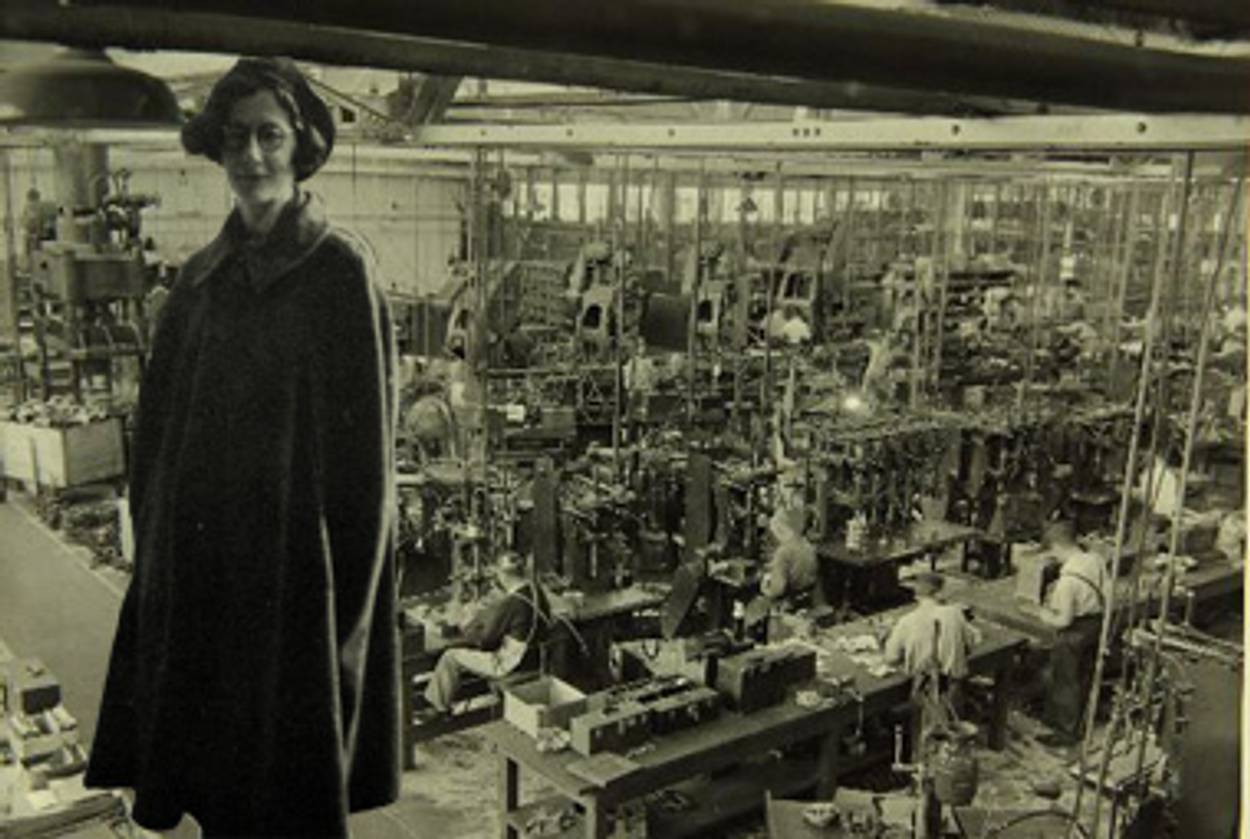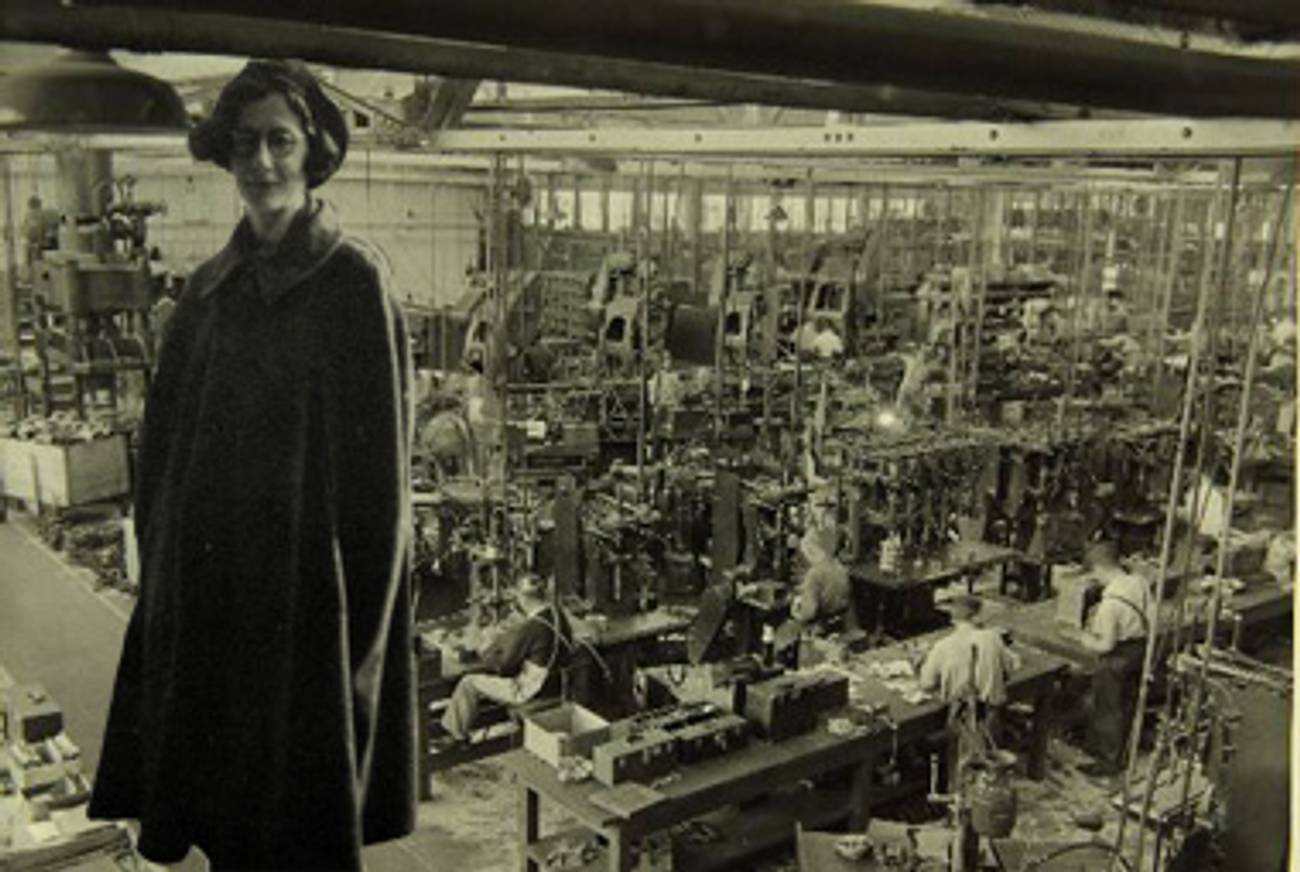Force of Life
As the great French intellectual Simone Weil understood, modern life is all about work and war. Memorial Day and Labor Day, then, are perfect opportunities to take stock of our modern condition.




Between the barbecues and ballgames that punctuated my Memorial Day weekend, I went to my office to clear off my stereotypically messy college-professor desk. While I was shifting the towering piles of paper from one spot to another, I came across an old photocopy of a text by Simone Weil: “The Iliad, Or the Poem of Force.” Reading the fading pages, I sensed, quite unexpectedly, that this beautiful and searing essay on Homer’s epic unearthed a deep connection between the two holidays, Memorial Day and Labor Day, that we Americans usually think of as merely the bookends to summer vacation. War and work, Weil observed, are the twin pillars of the modern experience, creating the frame through which contemporary life is best observed.
One of the 20th century’s most original and unsettling thinkers, Weil was born into a Gallic version of J.D. Salinger’s Glass family. Her parents were worldly and smart Parisians who considered their Jewishness much as Weil’s father, Bernard, a successful doctor, viewed the appendix: the residue of evolution. Weil’s powerful mother, Selma, oversaw a rambling apartment on the Boulevard Saint-Michel that, according to one observer, resembled a “genius factory.” At the age of 14, her brother, André, entered the prestigious Ecole Normale Supérieure, where he dazzled his mathematics professors, while Simone had mastered Latin, Greek, German, and English by the age at which other Jewish girls were preparing for their bat mitzvahs. The siblings spent their childhood arguing over passages in Racine and Pascal and their later years comparing notes on Eastern religions, in particular Buddhism.
As for her native Judaism, Weil had little good to say about it. Indeed, she protested mightily against what she thought were Judaism’s manifest shortcomings, especially in comparison to Christianity. Weil probably protested too much—there are deep Jewish concerns that infuse her work—but her protests nevertheless led her to a long flirtation with conversion to the Roman Catholic Church. In fact, if André resembled Salinger’s Zooey Glass, Simone shared Franny’s driven, spiritual, and self-punishing character. As a toddler, she chose to deny herself sugar as a gesture of sympathy with the French soldiers in the trenches; as a graduate of the Ecole Normale Supérieure, she chose to work on factory assembly lines; she fought with the Republicans in the Spanish Civil War and later, as an exile from France, joined de Gaulle’s Free French in London.
Heroic as these endeavors might have been in theory, in practice they often led Weil to the brink of disaster. As an assembly-line worker, she cut and burned herself repeatedly on the machinery, and she was fired when she could not maintain the numbing pace of work. As a volunteer in Spain, her clumsiness and near-sightedness led her to step in a pot of boiling oil during a reconnaissance mission, necessitating her evacuation to France. As for the Free French, when her proposal to command a group of uniformed “nurses” who would parachute into France in order to tend the wounded was shot down by de Gaulle—“She’s crazy!” he shouted—Weil instead chose to starve herself to death in an English hospital.
When we consider Weil’s attenuated and atypical life, we may be tempted to agree with de Gaulle. But when we consider her understanding of war and work—the two, Weil argued, were deeply intertwined—we might take issue with the celebrated general.
In early 1941, scarcely six months after France’s defeat and occupation by Nazi Germany, a literary journal in the unoccupied zone, Cahiers du Sud, published Weil’s “The Iliad, Or the Poem of Force.” The essay, the style and substance of which are as angular and astringent as its author, approaches Homer’s poem from a perspective firmly rooted in the horrors of the 20th century. The war Homer sings about concerns the Greeks and Trojans—a war launched by Paris’ taking of Helen and ending with the Greeks’ taking of Troy. In between, Homer’s epic poem unfurls conversations among women about their lot in war, among soldiers about honor and duty, and among gods and goddesses about their petty jealousies and rages. And, of course, the poem recounts in surgically precise detail the many deaths on both sides in battle. Hector kills Achilles’ friend Patroclus, Achilles wreaks his revenge on Hector, and Priam—Hector’s father—and Achilles close the poem by joining one another in a common grief.
For most readers over the last two millennia, Homer’s epic is about warriors seeking to realize their excellence, or arête, on the battlefield, a singular and glorious pursuit. But, as Weil argued, the poem, in a deep sense, is about men at work as much as about men at war. A veteran of work on the battlefield and in the factory, Weil had the temerity to offer her own radical interpretation: While most traditional readers argued over which soldier is the hero of the story—Hector, who dies while defending his city, or Achilles, who dies after avenging his friend—Weil claimed that “The true hero, the true subject, the center of the Iliad is force.”
Force, for Weil, is like gravity, a sort of necessity pressing without remorse on humankind. It turns us, she wrote, into things—physical matter shorn not just of life, but also of dignity. Given Weil’s own life, lashed by the gales of history and witness to the endless hecatombs of World War I and relentless Nazi machinery in World War II, it is perhaps not surprising that she insisted that force pure and simple infused the world. The power weighing on Homer’s soldiers, as they batter and behead one another, has nothing to do with honor, she argued, and everything to do with the nature of our world. Friends and foes are all condemned.
This empire of force, Weil insisted, bleeds into nearly every aspect of our lives. No one in the Iliad, she wrote, is “spared by force, as no one on earth is.” This was true not only of ancient Greece, but also of early 20th-century France, where factory workers faced the very same crushing force. Weil knew it well: In December 1934, when she began to punch the clock at Alsthom, a factory making electrical parts for trains, the rhythm and nature of the work, the quest for productivity and indifference to the well-being of the workers, made for an earthly hell. As she raced to meet her daily quota, Weil found that she was emptied of all thoughts and feelings; instead, akin to a “thing” she simply submitted, leaving the factory at the end of the day with just one hope: “that they will allow me to spend yet another such day.”
A half century later, not much has changed. Behind the fogs of war in Afghanistan and Iraq lies the same force that, in Weil’s words, “turns man into a thing in the most literal sense: it makes a corpse out of him.” The expanding use of drones, guided from planes high above or bases far away, emphasizes the impersonality of this fatal force described by Weil. But that same force also flows through firefights in Helmand Province and street battles in Ramadi, bloody scenes that are as intimate and confused as the clashes on the beach or near the walls of Troy. Force rules the modern workforce as well: Whether on our disappearing assembly lines or multiplying office cubicles, we do not seem all that far removed from the lot of Charlie Chaplin in Weil’s favorite film, Modern Times.
Yet Weil’s protestations are not all gloomy. Force, she argued, by its impassive and immovable character, makes possible “luminous moments”—when a warrior plumbs his soul, for example, or converses with a fellow soldier or embraces his son or wife. These moments also existed in factories. In her Factory Journal, Weil marveled at gestures of kindness shared between workers, or even instances of self-sacrifice. These moments allow each and everyone of us to see the humanity of our fellow beings, friend or foe. And even the most terrible force, Weil wrote, can never erase the memory of such tender and humane moments.
Equally crucial, for Weil, was the fact that force is an equal-opportunity destroyer. Commenting on the ups and downs of the Trojans and Greeks, she concludes: “force is as pitiless to the man who possesses it, or thinks he does, as it is to his victims; the second it crushes, the first it intoxicates. The truth is, nobody really possesses it.” Enemies like Osama Bin Laden have been finally and deservedly crushed; but Weil warned us against intoxication. Ultimately, she wrote, no one side can master force for very long, for its nature is fungible: Human beings are little more than vessels carried by the force of force. “The strong are, as a matter of fact, never absolutely strong,” she wrote, “nor are the weak absolutely weak, but neither is aware of this.”
Memorial Day rightly calls upon us to honor our men and women at war, just as Labor Day asks the same respect and gratitude toward our men and women at work. For Weil, such commemoration is also right and good. No matter how vigorously she rejected her own Judaism, by shedding light on these rare luminous moments that arise suddenly from work and war, Weil should be considered a modern-day tzaddik, a truly righteous thinker.
Robert Zaretsky is professor of history in the Honors College, University of Houston, and the author, most recently, of Albert Camus: Elements of a Life.
Robert Zaretsky is professor of history in the Honors College, University of Houston, and is a contributor to The Occupy Handbook, to be published next month by Little, Brown.